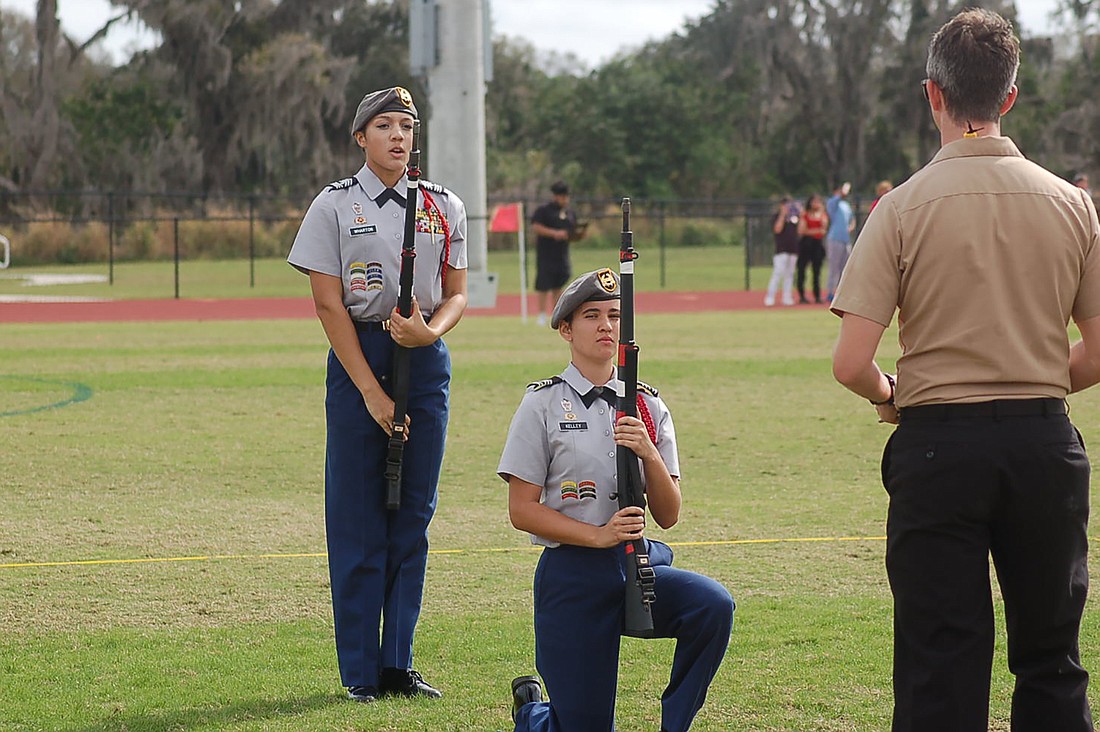- October 23, 2024
-
-
Loading

Loading

When Adanna Wharton and Madison Kelley finish their Junior Reserve Officers’ Training Corps drill team dual exhibition routine, they have a special gesture they are planning to make.
Wharton, a Braden River High School junior, and Kelley, a sophomore, are big fans of “Black Panther: Wakanda Forever,” a movie released in November 2022.
To show love for the movie, Wharton and Kelley will cross their arms in an “x” over their chest, just like the gesture made popular in the Marvel movie, as they wait for the judges to give them permission to exit the field after their routine.
That gesture is one of the aspects they like about competing in drill team dual exhibitions.
The students have creative control over their routines unlike the larger teams which have a set routine and strict rules that need to be followed. They have 2 to 3 minutes to produce a routine that best showcases their spinning skills and their ability to be in sync.
In dual competition, the competitors can base their routines on their abilities and challenge themselves to learn and incorporate more complicated spins.

“You’re spending all night in your backyard trying to figure out how to put pieces together,” senior Julianna Chupp said. “You learn a new spin and you’re trying to figure out how to fit it into your routine or how to make it look like it’s all flowing together. When you’re trying to come up with your own spin, you try eight different variations of it. It’s a lot of stress, but it’s also a lot of fun.”
Senior Taylor Fairchild said the biggest challenge is finding a way to make routines unique.
With only two people competing, all eyes are on them and there’s no hiding any mistakes.
“There’s no one to blame a mistake on but yourself,” Wharton said. “You need to pick it up and fix it for the next competition. That does kind of add to the stress that there’s no reason you mess up besides yourself.”
Chupp said, however, that it is easy in dual competition to tell when they have impressed the judges. She recalled doing the “death wave,” one of the most difficult spins she’s had to learn.
“I got a whole bunch of new bruises from (learning) it, but as soon as I did it, I could see the judges’ jaw drop,” Chupp said. “It felt amazing because you know that you did well.”
Going into their routines, students said they are nervous, but once they’re in the box, they know they’re prepared to compete.
“Going in, my only thought is, ‘Oh my God, why are my hands sweating so much?’ and ‘I’m going to drop (the rifle),” Kelley said. “Once we do it together, and it goes smoothly, I feel rewarded.”
Wharton said because their routine can change throughout the season as they find ways to improve it, if someone forgets their routine in the middle of the competition, they can always improvise. For example, Wharton was competing as an individual and forgot her routine and she had to think on her feet.
“I kind of just blanked out in the middle of the box,” she said. “With everyone watching, the whole drill team was standing there watching me, I didn’t know what to do. I figured I’m going to do a couple spins and leave.”
When she was done with her routine, JROTC instructor Alexander Figueroa said her routine was “state (competition) worthy.”
Working closely together to develop their routines and learn their partners’ strengths and weaknesses gives the students an opportunity for them to develop trust.
Wharton and Kelley were acquaintances before, but being partners in the duel exhibitions has made them friends who talk every day.
Junior Jeremiah Gonzalez said being in a duel exhibition for the first time has opened his eyes to what he can do as well as his limitations. He’s been working on developing his own original spins.
Being a part of a duel exhibition team means the students are creating and practicing their routines outside of school and JROTC hours. They spend hours perfecting their routine throughout the season up until they compete at the regional competition in hopes of moving onto state.
Even though it’s more work, the students said it doesn’t feel like work.
“It’s like extreme recess,” Kelley said.
Gonzalez sees practicing his routine as an escape.
“We can do it on our own time,” he said. “You don’t have set hours we have to do at home every day, and we don’t have to spend three hours on it like we do in practice. I’ll go home, listen to music and practice spinning. It’s just fun. It takes me away from everything.”